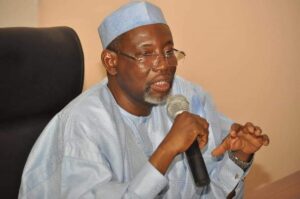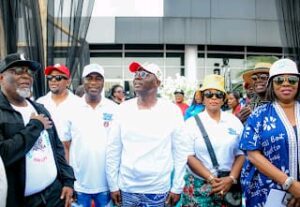NHRC calls for more understanding of Universal Periodic Review
The National Human Rights Commission (NHRC) on Monday called for more understanding of Universal Periodic Review (UPR) as a working tool in understanding and dealing with human rights issues.
The Executive Secretary of the Commission, Tony Ojukwu stated this in Abuja on Tuesday at the public presentation of a book written by Dr. Uchenna Emelonye, entitled: “Dialectics of Rights: Nigeria’s Engagement with the Universal Periodic Review of the Human Rights Council.”
“It is the first of its kind in Nigeria, a single publication x-raying Nigeria’s three times engagement with the UPR process.
“The book is an insightful work of research, a veritable piece upon which the various actors in both government and civil society can learn from and build on to successfully engage future UPR processes.
“The Commission set out to collaborate with Dr. Uche Emelonye in putting together this piece of document in fulfilment of its role of facilitating understanding, research and discussion around human rights issues, to enable Nigeria fulfil its international human rights obligations and improve the climate for the enjoyment of human rights in Nigeria,” Ojukwu said.
Ojukwu, who also co-edited the book, reiterated that the goal of the UPR was to seek to improve human rights situations in every country, through regular assessment of human rights developments and challenges faced by the member states.
He described the UPR as a human rights promotion and protection system of the United Nations General Assembly that came into existence through Resolution 60/251 of March, 2006.
The review, according to him, was to assess the commitment of member states to their international human rights obligations.
The Minister of Foreign Affairs, Geoffrey Onyeama, who was the Chairman at the launch, was represented by Ambassador Akinremi Bolaji.
He noted that Nigeria was an important player in global and regional stability and was entirely committed to partnership with countries of similar disposition, in the promotion and protection of human rights both at home and abroad.
“We have fully participated in the UPR process since inception and have been reviewed on three different occasions: February 2009, October 2013 and November 2018.
“There have been series of remarkable contributions in ensuring that the fundamental human rights of Nigerians are protected abroad,” he said.
Onyema said that the Ministry, through its Missions abroad, had attended to a notable number of petitions from Nigerians in Diaspora concerning human rights abuses.
The Attorney General, Abubakar Malami SAN, who was represented by Abiodun Aikhomu, stated that Nigeria had demonstrated its commitment to the UPR process by granting access to the UN Special Rapporteurs to visit Nigeria.
“In August and September 2019, Nigeria played host to the Special Rapporteur on Extra Judicial, Summary or Arbitrary Executions and the Special Rapporteur on the right to Housing.
“We appreciate the laudable achievements of the commission, which includes mainstreaming respect for human rights in internal security operations by the military and other security forces.
“Also, addressing the menace of sexual and gender-based violence, development of a National Plan for the Promotion and Protection of Human Rights and mainstreaming a rights-based approach in sustainable development plans and implementation,” he said.
Eze Onyekpere, the book reviewer, said in his analysis that the publication reported Nigeria’s engagement with the UPR from the First National Report to the Third National Report.
The 357-paged book documented Nigeria’s report, United Nation’s Treaty Bodies and Special Procedures reports, other stakeholders report, Report of the Working Group and the Response of the Nigerian Delegation, he said, adding that the publication had filled a vacuum.
“It is the first of its kind, the three Nigerian Universal Periodic Reports cut across all generation of human rights, from civil, political, economic, social.
“Also environmental, children and women, persons living with disability, vulnerability, gay and lesbians,” he said.
Onyekpere added that the reports were far reaching and sought to portray what the government had done in fulfilment of its obligations.
He cited the work as providing a detailed rich account that can be relied upon in preparing dissertations by researchers, journalists and historians, and also in teaching students human rights and for the media to inform the public.
Goodwill messages were received from Prof. Joy Ezeilo, Executive Director WACOL, Chief of Defence staff, Nigerian Correctional Center, Fiscal Responsibility Commission and the Vice-Chairman, NBA Bwari Branch.




